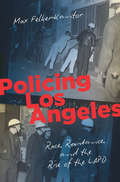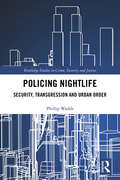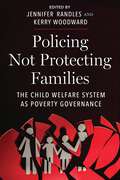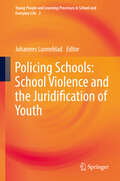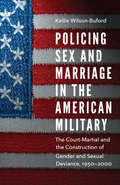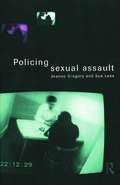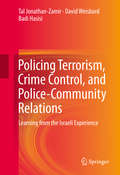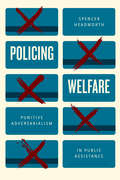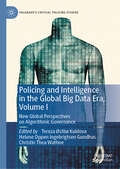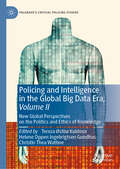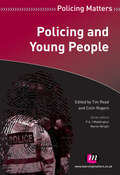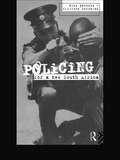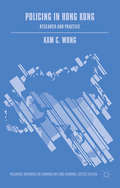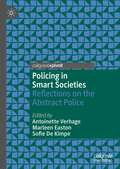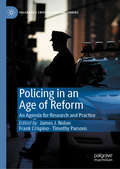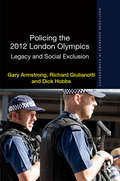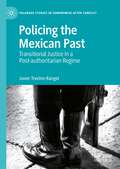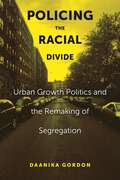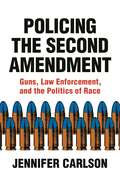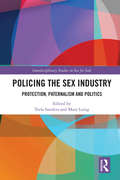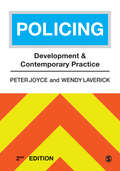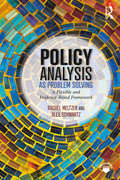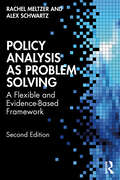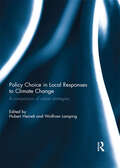- Table View
- List View
Policing Los Angeles: Race, Resistance, and the Rise of the LAPD (Justice, Power, and Politics)
by Max Felker-KantorWhen the Los Angeles neighborhood of Watts erupted in violent protest in August 1965, the uprising drew strength from decades of pent-up frustration with employment discrimination, residential segregation, and poverty. But the more immediate grievance was anger at the racist and abusive practices of the Los Angeles Police Department. Yet in the decades after Watts, the LAPD resisted all but the most limited demands for reform made by activists and residents of color, instead intensifying its power. In Policing Los Angeles, Max Felker-Kantor narrates the dynamic history of policing, anti–police abuse movements, race, and politics in Los Angeles from the 1965 Watts uprising to the 1992 Los Angeles rebellion. Using the explosions of two large-scale uprisings in Los Angeles as bookends, Felker-Kantor highlights the racism at the heart of the city's expansive police power through a range of previously unused and rare archival sources. His book is a gripping and timely account of the transformation in police power, the convergence of interests in support of law and order policies, and African American and Mexican American resistance to police violence after the Watts uprising.
Policing Nightlife: Security, Transgression and Urban Order (Routledge Studies in Crime, Security and Justice)
by Phillip WaddsNightlife is a place of both real and imagined risk, a ‘frontier’ (Melbin 1978) where apparent freedom and transgression are closely linked, and where regulation of leisure and collective intoxication has been diffused throughout an expanding network of state and private actors. This book explores Sydney’s contemporary night-time economy as the product of an intersection of both local and global transformations, as policing comes to incorporate more and more ‘private’ personnel empowered to regulate ‘public’ drinking and nightlife. Policing Nightlife focuses on the historical and social conditions, cultural meanings and regulatory controls that have shaped both public and private forms of policing and security in contemporary urban nightlife. In so doing, it reflects more broadly on global changes in the nature of contemporary policing and how aspects of neoliberalism and the ideal of the ‘24-hour city’ have shaped policing, security and night-time leisure. Based on a decade of research and interviews with both police and doorstaff working in nightlife settings, it explores the effectiveness of policies governing policing and private security in the night-time economy in the context of media, political and public debates about regulation, and the gendered and highly masculine aspects of much of this work. An accessible and compelling read, this book will appeal to students and scholars of criminology, policing, sociology and those interested in understanding the debates surrounding security, policing and contemporary urban nightlife.
Policing Not Protecting Families: The Child Welfare System as Poverty Governance (Critical Perspectives on Youth)
by Jennifer Randles Kerry WoodwardControlling, surveilling, and punishing poor families through the child welfare systemIn a typical year, one in five US children have some interaction with the child welfare system. Countless other families, particularly those who struggle to care for their children due to poverty or economic insecurity, fear child welfare system involvement. Though imagined as a system that protects children from caregivers’ maltreatment, contributors to Policing Not Protecting Families argue that the child welfare system polices and punishes poor parents who are unable to meet white, middle class parenting standards due to structural inequalities.Bringing together scholars from anthropology, sociology, law, and social work, this collection is the first to critically examine the child welfare system’s role in governing poor, disproportionately Black and Native families. It shows that the child welfare system is a key site of poverty governance, or state control and management of poor families. Chapters bring together empirical research from diverse settings across the US, highlighting the system’s interactions with other state systems and its wide impact on marginalized families. Together the chapters illustrate the failure of the child welfare system to protect children and families from the structural inequalities that shape the lives of poor and other marginalized families.
Policing Schools: School Violence and the Juridification of Youth (Young People and Learning Processes in School and Everyday Life #2)
by Johannes LunnebladThis book examines the global phenomenon of school violence and its wide range of behaviours, from school shootings to minor theft, bullying and sexual harassment. Studying the Nordic countries and taking Sweden as an example and case study, the book discusses key features of sexuality, bullying and cyberbullying, radicalization, and violent extremism. It examines different approaches to school violence and discusses them in relation to political and ideological influences, gender relations, and socio-economic conditions. It presents trends in prevention of school violence, policing the school and dilemmas in educating against violent extremism. Since most of the research in this field has been done in post-industrial democracies such as Australia, the UK and the US, the book contributes to the debate by offering new perspectives on violence in schools from the Nordic countries.
Policing Sex and Marriage in the American Military: The Court-Martial and the Construction of Gender and Sexual Deviance, 1950–2000 (Studies in War, Society, and the Military)
by Kellie Wilson-BufordThe American military’s public international strategy of Communist containment, systematic weapons build-ups, and military occupations across the globe depended heavily on its internal and often less visible strategy of controlling the lives and intimate relationships of its members. From 1950 to 2000, the military justice system, under the newly instituted Uniform Code of Military Justice, waged a legal assault against all forms of sexual deviance that supposedly threatened the moral fiber of the military community and the nation. Prosecution rates for crimes of sexual deviance more than quintupled in the last quarter of the twentieth century. Drawing on hundreds of court-martial transcripts published by the Judge Advocate General of the Armed Forces, Policing Sex and Marriage in the American Military explores the untold story of how the American military justice system policed the marital and sexual relationships of the service community in an effort to normalize heterosexual, monogamous marriage as the linchpin of the military’s social order. Almost wholly overlooked by military, social, and legal historians, these court transcripts and the stories they tell illustrate how the courts’ construction and criminalization of sexual deviance during the second half of the twentieth century was part of the military’s ongoing articulation of gender ideology. Policing Sex and Marriage in the American Military provides an unparalleled window into the historic criminalization of what were considered sexually deviant and violent acts committed by U.S. military personnel around the world from 1950 to 2000.
Policing Sexual Assault
by Jeanne Gregory Sue LeesPolicing Sexual Assault provides a detailed account of current police practice in the UK in response to sexual assault. The authors use case studies and interviews to find out why when the number of rape cases has almost trebled since 1985, the proportion of cases resulting in a conviction has dropped from 24% to 8.6%. Chapters cover: an overview of existing research police culture police recording practices the role of the Crime Prosecution Service male rape analysis of the judicial process interviews with complainants and first-hand accounts of their experiences proposals for reform. The authors place their findings within the context of theoretical debates about domestic and sexual violence and examine the gap between official condemnations of male violence, as enshrined in law, and the realities of the victims' (male and female) experiences - whereby the violence is too often condoned.
Policing Terrorism, Crime Control, and Police-Community Relations
by David Weisburd Tal Jonathan-Zamir Badi HasisiThis timely and important work takes a critical look at the shifting role of police, who are becoming increasingly responsible for handling terrorism threats on top of their regular responsibilities. With an unprecedented empirical study, the authors of this book examine whether this increased focus on security-related threats may come at the expense of addressing "classic" police responsibilities, such as fighting crime and dealing with local, day-to-day community problems. They also examine whether this shift has had a detrimental effect on police-community relationships and perceptions of police legitimacy, as their role changes from "service" to "suspicion. " Through a four-year, multi-method study specifically focused on the Israel National Police, the authors of this work have examined the effects of this shifting role on a number of key areas of policing concern, namely: police effectiveness at fighting crime and police legitimacy, drawing conclusions applicable to any democratic police force. The results of the study provide a number of concrete recommendations for maintaining effectiveness and community relationships of the police, with increasing responsibilities, challenges, and limited resources. This work will be of interest for researchers in criminology and criminal justice, particularly with a focus on police studies and counter-terrorism; police administrators; and researchers in related disciplines, such as sociology and public administration.
Policing Welfare: Punitive Adversarialism in Public Assistance
by Spencer HeadworthMeans-tested government assistance in the United States requires recipients to meet certain criteria and continue to maintain their eligibility so that benefits are paid to the “truly needy.” Welfare is regarded with such suspicion in this country that considerable resources are spent policing the boundaries of eligibility, which are delineated by an often confusing and baroque set of rules and regulations. Even minor infractions of the many rules can cause people to be dropped from these programs, and possibly face criminal prosecution. In this book, Spencer Headworth offers the first study of the structure of fraud control in the welfare system by examining the relations between different levels of governmental agencies, from federal to local, and their enforcement practices. Policing Welfare shows how the enforcement regime of welfare has been constructed to further stigmatize those already living in poverty and deepens disparities of class, race, and gender in our society.
Policing and Intelligence in the Global Big Data Era, Volume I: New Global Perspectives on Algorithmic Governance (Palgrave's Critical Policing Studies)
by Tereza Østbø Kuldova Helene Oppen Ingebrigtsen Gundhus Christin Thea WathnePolicing and Intelligence in the Global Big Data Era, Volume I, the first of a two volume set, presents a rich and unique collection of global perspectives on data-driven predictive technologies and the expansion and use of surveillance apparatuses in policing and intelligence, both public and private. Centered around the notion of ‘algorithmic governance’, this volume explores various practices of abstract and intelligence-led policing within the context of surveillance and regulatory capitalism. Each chapter interrogates these concepts as much as realities on the ground as they play out across the globe – from Russia, USA, India, Brazil to Denmark, Germany and Norway. The volume offers a unique insight into the ways in which technologies and data-driven practices – from facial recognition, predictive algorithms, to generative AI – are reshaping cultures of policing both within and beyond police proper. Particular attention is paid to the simultaneous privatization and pluralization policing and intelligence and to the proliferation of new intelligence actors. Academics, students and readers interested in the fields of criminology, social anthropology, critical algorithm.
Policing and Intelligence in the Global Big Data Era, Volume II: New Global Perspectives on the Politics and Ethics of Knowledge (Palgrave's Critical Policing Studies)
by Tereza Østbø Kuldova Helene Oppen Ingebrigtsen Gundhus Christin Thea WathneThis volume, the second of a two volume set, offers a rich and unique collection of global perspectives on data-driven predictive technologies and the expansion and use of surveillance apparatuses in policing and intelligence, both public and private. Volume II delves into the epistemologies of data, into the imaginaries of accuracy, and fantasies of technosolutionism, utilizing empirical case studies to interrogate the use of data in policing, while raising questions pertaining to governance, ethics and knowledge construction. The chapters span from exploring the construction of clean and dirty data in private and public policing in South Africa, discussions about facial recognition and technopolitics in Brazil, the construction of intelligence and organizational learning in Norwegian police ethics and broader questions of transparency, data quality, and trust in data-driven policing, to the very topical issues of policing of generative AI and the ways in which both authoritarian and liberal democracies, such as China and India, use biopolitics to turn social welfare into surveillance. Academics and students of criminology, social anthropology, critical algorithm studies, critical sociology, and regional studies, will find this timely volume of interest.
Policing and Young People (Policing Matters Series)
by P A J Waddington Martin Wright Tim Read Colin RogersAn accessible and up to date introduction to the key theme of policing and young people. This text gives a comprehensive overview of the issues involved in working with young people as offenders, suspects, witnesses, victims and citizens. It looks at perceptions of the young, and the role of the media in the context of current debates around anti-social behaviour, gangs and the family. The impact of multi-agency approaches on the way that young people are dealt with by the police and other agencies is considered, and additional chapters discuss police discretion and ethics, and safeguarding vulnerable young people.
Policing for a New South Africa
by Mike Brogden Clifford D. ShearingFirst published in 1993. Routledge is an imprint of Taylor & Francis, an informa company.
Policing in Hong Kong: Research and Practice (Palgrave Advances in Criminology and Criminal Justice in Asia)
by Kam C. WongThis comprehensive book examines the state of research on policing in Hong Kong. It surveys the history and development of the field of police studies in Hong Kong, and examines the various methods, problems and prospects in the field.
Policing in Smart Societies: Reflections on the Abstract Police (Palgrave's Critical Policing Studies)
by Antoinette Verhage Marleen Easton Sofie De KimpeSmart societies pose new challenges for police organizations. Demands for more efficiency and effectiveness test police organizations which are often resistant to change. This book uses the concept of the abstract police to describe the way in which police organizations have tried to adapt to these new evolutions and the consequences. The chapters stem from a conference called “Street Policing in a Smart Society” which sought to frame and analyse these developments in policing. In this book, the concept of the abstract police is introduced, analysed and then challenged from different angles, looking at the evolutions related to technology, plural policing, police discretion and police decision making. As such, the book is a reflection of current debates on policing and police organization, aiming to give input to the debate by providing new insights on police and police work.
Policing in an Age of Reform: An Agenda for Research and Practice (Palgrave's Critical Policing Studies)
by Timothy Parsons James J. Nolan Frank CrispinoThis book tackles the contentious issue of policing in an age of controversy and uncertainty. It is a timely book written by police scholars — predominantly former practitioners from Europe, Australia and North America — who draw from their own research and operational experiences to illuminate key issues relating to police reform in the present day. While acknowledging some relevance of usual proposed models, such as problem-solving, evidence-based policing and procedural justice, the contributors provide an insider look at a variety of perspectives and approaches to police reform which have emerged in recent decades. It invites university students, criminologists, social scientists, police managers, forensic scientists to question and adapt their perspectives on a broad range of topics such as community policing, hate crime, Islamic radicalisation, neighborhood dynamics, situational policing, antidiscrimination and civil society, police ethics, performance measures, and advances in forensic science, technology, intelligence and more in an accessible and comprehensive manner.
Policing the 2012 London Olympics: Legacy and Social Exclusion (Routledge Advances in Ethnography)
by Gary Armstrong Richard Giulianotti Dick HobbsThe summer Olympic Games are renowned for producing the world’s biggest single-city cultural event. While the Olympics and other sport mega-events have received growing levels of academic investigation from a variety of disciplinary approaches, relatively little is known about how such occasions are experienced directly by local host communities and publics. This ethnography examines the everyday policing of the London Borough of Newham in relation to the London 2012 Olympics. It explains how police defined, monitored, prioritized, contained and investigated ‘Olympic-related’ crime, and how ‘Olympic-related’ policing connected to the policing of Newham. The authors examine how the threat of terrorism impacted on the everyday policing of the 2012 Olympics, as well as the exaggeration of other threats to the Games – such as youth gangs – for political reasons. The book also explores local resistance to Olympic policing, and the legacy of the Games with regard to policing, local housing, demographics and social exclusion. Discussing the lessons that can be learned for the future staging of sporting mega-events, this book will appeal to scholars and students with interests in sport, policing, crime and criminology, mega-events, event management, urban studies, global studies and sociology.
Policing the Mexican Past: Transitional Justice in a Post-authoritarian Regime (Palgrave Studies in Compromise after Conflict)
by Javier Trevino-RangelThis book critically examines transitional justice in Mexico. It explores how the Mexican democratic regime dealt with the grave human rights violations perpetrated by security forces during the authoritarian era (1929-2000) through a Special Prosecutor’s Office. It offers a complete account of the diverse factors that facilitated the emergence (and policing) of Mexico's transitional justice process. Whilst transitional justice should contribute to the advancement of liberal democracy and, consequently, generate the following benefits: truth, justice, political reconciliation, peace, this book argues that Mexico is a case of transitional injustice. It is an example of how in some societies transitional justice mechanisms are intentionally implemented in ways that, instead of generating justice, produce impunity. It makes important contributions to some of the broader debates addressed by scholars on transitional justice and gives them reason to re-examine transitional justice processes in other countries in a new light.
Policing the Racial Divide: Urban Growth Politics and the Remaking of Segregation
by Daanika Gordon2023 Edwin H. Sutherland Book Award WinnerA behind-the-scenes account of the harsh realities of policing in a segregated city For thirteen months, Daanika Gordon shadowed police officers in two districts in “River City,” a profoundly segregated rust belt metropolis. She found that officers in predominantly whiteneighborhoods provided responsive service and engaged in community problem-solving, while officers in predominantly Black communities reproduced long-standing patterns of over-policing and under-protection. Such differences have marked US policing throughout its history, but policies that were supposed to alleviate racial tensions in River City actually widened the racial divides. Policing the Racial Divide tells story of how race, despite the best intentions, often dominates the way policing unfolds in cities across America.Drawing on in-depth interviews and hundreds of hours of ethnographic observation, Gordon offers a behind-the-scenes account of how the police are reconfiguring segregated landscapes. She illuminates an underexplored source of racially disparate policing: the role of law enforcement in urban growth politics. Many postindustrial cities are increasing the divisions of segregation, Gordon argues, by investing in downtowns, gentrified neighborhoods, and entertainment corridors, while framing marginalized central city neighborhoods as sources of criminal and civic threat that must be contained and controlled. Gordon paints a sobering picture of modern-day segregation, and how the police enforce its racial borders, showing us two separate, unequal sides of the same city: one where rich, white neighborhoods are protected, and another where poor, Black neighborhoods are punished.
Policing the Second Amendment: Guns, Law Enforcement, and the Politics of Race
by Jennifer CarlsonAn urgent look at the relationship between guns, the police, and raceThe United States is steeped in guns, gun violence—and gun debates. As arguments rage on, one issue has largely been overlooked—Americans who support gun control turn to the police as enforcers of their preferred policies, but the police themselves disproportionately support gun rights over gun control. Yet who do the police believe should get gun access? When do they pursue aggressive enforcement of gun laws? And what part does race play in all of this? Policing the Second Amendment unravels the complex relationship between the police, gun violence, and race. Rethinking the terms of the gun debate, Jennifer Carlson shows how the politics of guns cannot be understood—or changed—without considering how the racial politics of crime affect police attitudes about guns.Drawing on local and national newspapers, interviews with close to eighty police chiefs, and a rare look at gun licensing processes, Carlson explores the ways police talk about guns, and how firearms are regulated in different parts of the country. Examining how organizations such as the National Rifle Association have influenced police perspectives, she describes a troubling paradox of guns today—while color-blind laws grant civilians unprecedented rights to own, carry, and use guns, people of color face an all-too-visible system of gun criminalization. This racialized framework—undergirding who is “a good guy with a gun” versus “a bad guy with a gun”—informs and justifies how police understand and pursue public safety.Policing the Second Amendment demonstrates that the terrain of gun politics must be reevaluated if there is to be any hope of mitigating further tragedies.
Policing the Sex Industry: Protection, Paternalism and Politics (Interdisciplinary Studies in Sex for Sale)
by Teela Sanders Mary LaingThe exponential growth of sexual commerce, migration and movement of people into the sex industry, as well as localised concerns about transactional sex, are key areas of interest across the urban west. Given the complex regulatory frameworks under-which the sex industry manifests, the role of the police is significant. Policing the Sex Industry draws on the research and expertise of academics and practitioners, presenting advanced scholarship across a range of countries and spaces. Unpicking the relationship between police practice and commercial sex whilst speaking to the current policy agendas, Policing the Sex Industry explores key issues including: trafficking, decriminalisation, localised impacts of punitive policing approaches, uneven policing approaches, hate-crime approaches and the impact of policing on trans sex workers. A dynamic and incisive contribution to existing research, Policing the Sex Industry will appeal to undergraduate and postgraduate students, as well as researchers at all levels, interested in fields including Criminology, Sociology, Gender Politics and Women’s Studies
Policing: Development and Contemporary Practice
by Peter Joyce Wendy LaverickA comprehensive introduction to policing in England and Wales, providing you with an in-depth understanding of the challenges and complexities of modern policing and an increased awareness of the history and development of the profession. This second edition covers the most pressing debates and issues associated with contemporary policing and examines a range of key topics such as methods of policing, diversity and the police, police accountability, and much more. The new edition includes: A new chapter on women in policing Expanded content on diversity issues within the police service An account of the changes to transnational policing as a result of Brexit Reflections on the use of social media by police Advice for those wanting to embark on a career in the field. Written in an introductory way that is ideal for any policing, criminology, or criminal justice student new to police studies.
Policing: Development and Contemporary Practice
by Peter Joyce Wendy LaverickA comprehensive introduction to policing in England and Wales, providing you with an in-depth understanding of the challenges and complexities of modern policing and an increased awareness of the history and development of the profession. This second edition covers the most pressing debates and issues associated with contemporary policing and examines a range of key topics such as methods of policing, diversity and the police, police accountability, and much more. The new edition includes: A new chapter on women in policing Expanded content on diversity issues within the police service An account of the changes to transnational policing as a result of Brexit Reflections on the use of social media by police Advice for those wanting to embark on a career in the field. Written in an introductory way that is ideal for any policing, criminology, or criminal justice student new to police studies.
Policy Analysis as Problem Solving: A Flexible and Evidence-Based Framework
by Alex Schwartz Rachel MeltzerDrawing extensively from real-life cases, Policy Analysis as Problem Solving helps students develop the analytic skills necessary to advise government officials and nonprofit executives on a wide range of policy issues. Unlike other texts, Policy Analysis as Problem Solving employs a pragmatic, heterodox approach to the field. Whereas most texts on policy analysis are anchored in microeconomics, emphasizing economic efficiency, this book takes a broader view, using realistic examples to illustrate the full scope of policy analysis. The book provides succinct but thorough discussions of the key elements of the policy-analytic process, including problem definition, objectives and criteria, development of alternative policy options, and analysis of these alternatives. The text’s practical approach and extensive downloadable resources—which include interviews, case studies, and further readings—will be of enormous benefit to both students and instructors of policy analysis.
Policy Analysis as Problem Solving: A Flexible and Evidence-Based Framework
by Alex Schwartz Rachel MeltzerIn Policy Analysis as Problem Solving, authors Rachel Meltzer and Alex Schwartz provide a pragmatic yet fresh and original approach to the field. Emphasizing the importance of evidence and sound logic and drawing upon multiple perspectives and methods, the book guides readers through the process of making evidence-based decisions about policies. It offers a series of clear and comprehensive discussions about the key elements of the analytical process, beginning with steps to define the problem all the way until analysts arrive at a recommendation. The authors break from traditional approaches in their embrace of analytical flexibility and illustrate a broader framework for thinking about policy, both empowering and equipping readers to marshal a diverse array of evidence, techniques, and evaluative criteria in their analyses. Case studies threaded throughout the book illustrate the different ways in which problems can be framed and the kinds of policies and criteria that may flow from these alternative framings. Focusing on child support, voter turnout, water shortage, and short-term rental platforms, they also reveal the challenges and imperfect conditions that analysts encounter in the real world.Bolstered by an expanded scope, updates to its case studies, and refinements to its central arguments, the second edition of Policy Analysis as Problem Solving remains an excellent go-to resource for students and aspiring analysts in policy analysis and public policy courses.
Policy Choice in Local Responses to Climate Change: A Comparison of Urban Strategies
by Hubert Heinelt and Wolfram LampingSince the 1990s ‘beliefs’, ‘ideas’ or ‘knowledge’ as well as processes of communicative interactions such as persuasion, argumentation and learning have received increasing attention in social science for the understanding of political changes. This book makes a significant contribution to this scholarly debate and will be of interest to practitioners, showing on one side how climate change has received more and more attention in policy making at the local level and changed the urban agenda and on the other how different the responses of cities to this global challenge are – and how these differences between cities can be explained. This book was previously published as a special issue of Urban Research and Practice.
